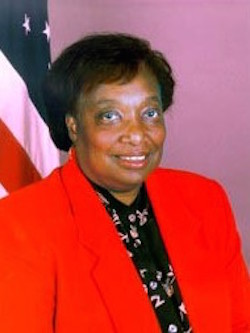Arlene Render became a Foreign Service officer in 1970 and has since served in many influential positions in the U.S. Department of State, including as Director of the Office of Central African Affairs, and ambassador to Gambia, Zambia, and Ivory Coast. In 1994-1995, Render played a significant role in seeking to limit the emerging violence of the Rwandan Genocide.
Born in Cleveland, Ohio, Render completed her Bachelor of Science degree from West Virginia State College in 1965 before earning a Master’s in Public Health from the University of Michigan in 1967. When she joined the Foreign Service in 1970, she was one of only 37 African American career Foreign Service officers.
After an initial posting to Abidjan, Ivory Coast, Render served in Tehran, Iran and Genoa, Italy. In 1979, Render was appointed to the Bureau of African Affairs, ultimately serving as Deputy Chief of Mission in Zaire (Congo) between 1981-1984, Consul General in Kingston, Jamaica in 1985, and Deputy Chief of Mission in Accra, Ghana from 1986-1989. From 1989 to 1990, Render participated in the U. S. State Department’s Senior Seminar, an important professional and educational opportunity that provided the foundation for her advancement in the Foreign Service.
President George H. W. Bush appointed Render to serve as Ambassador to Gambia in 1990, a position she held until 1993, when she became Director of the Office of Central African Affairs within the U.S. State Department.
While serving with the Office of Central African Affairs, Render traveled to Burundi and Rwanda in March 1994 with Deputy Assistant Secretary for African Affairs Prudence Bushnell to advocate for peace. In 1993, representatives of ethnic Hutus and Tutsis had signed the Arusha Peace Accords in Rwanda but struggled to implement this agreement. Render and Bushnell urged Rwandan military and political officials to limit anti-Tutsi radio messages and provide security in the increasingly unstable region. Within a few weeks of their visit, violence exploded in Rwanda with both Tutsis and moderate Hutus as targets of a developing genocide. Released memos from Render and Bushnell document their frustration with the failure of response to this crisis from either U.S. President Bill Clinton’s administration or the United Nations.
In following years, Render continued her service in Africa. Despite her criticism of President Clinton, she was appointed as Ambassador to Zambia from 1996 to 1999 and as Ambassador to the Ivory Coast between 2001 and 2004. In Zambia, she played a role in critiquing anti-democratic policies of President Frederick Chiluba. In Ivory Coast, she coordinated U.S. troop support for the protection of foreign nationals when internal violence broke out in 2002. She also worked with the United Nations High Commissioner for Refugees (UNHCR) to aid refugees from violence in Liberia, then living in camps in Ivory Coast. More than 8,000 Liberian refugees were re-settled in the United States between 2003 and 2005.
Following retirement from the Foreign Service, Render has continued to support attention to global affairs through participation in the American Academy of Diplomacy and in the Thursday Luncheon Group, an African American organization that promotes minority participation in U.S. foreign policy.

